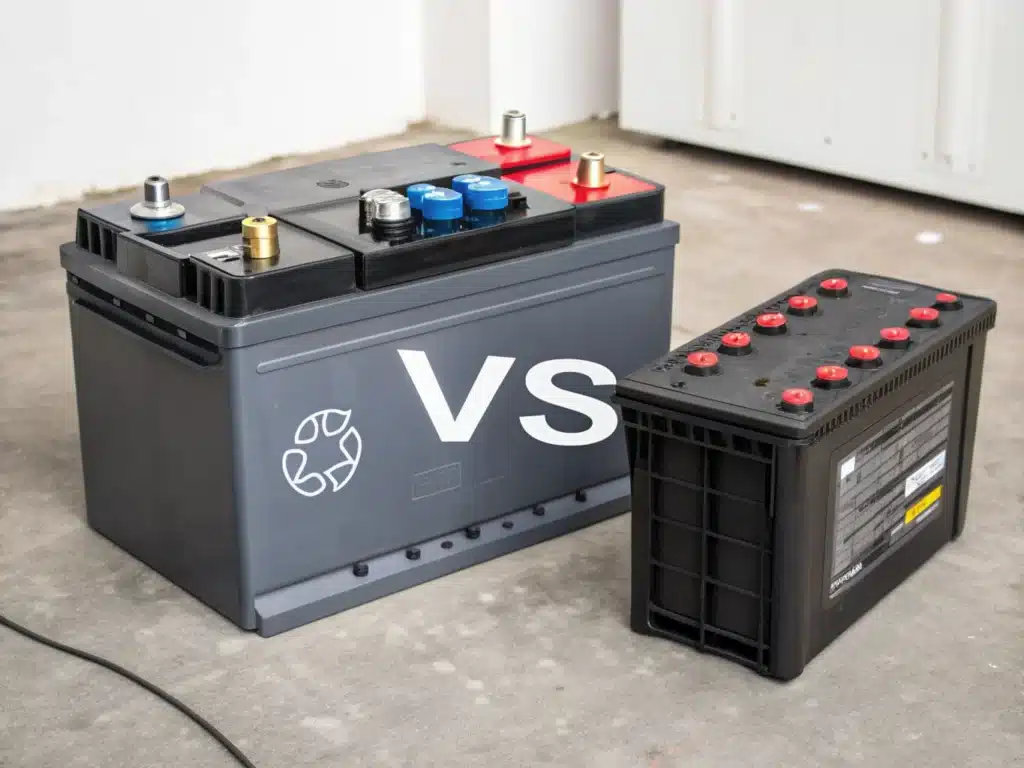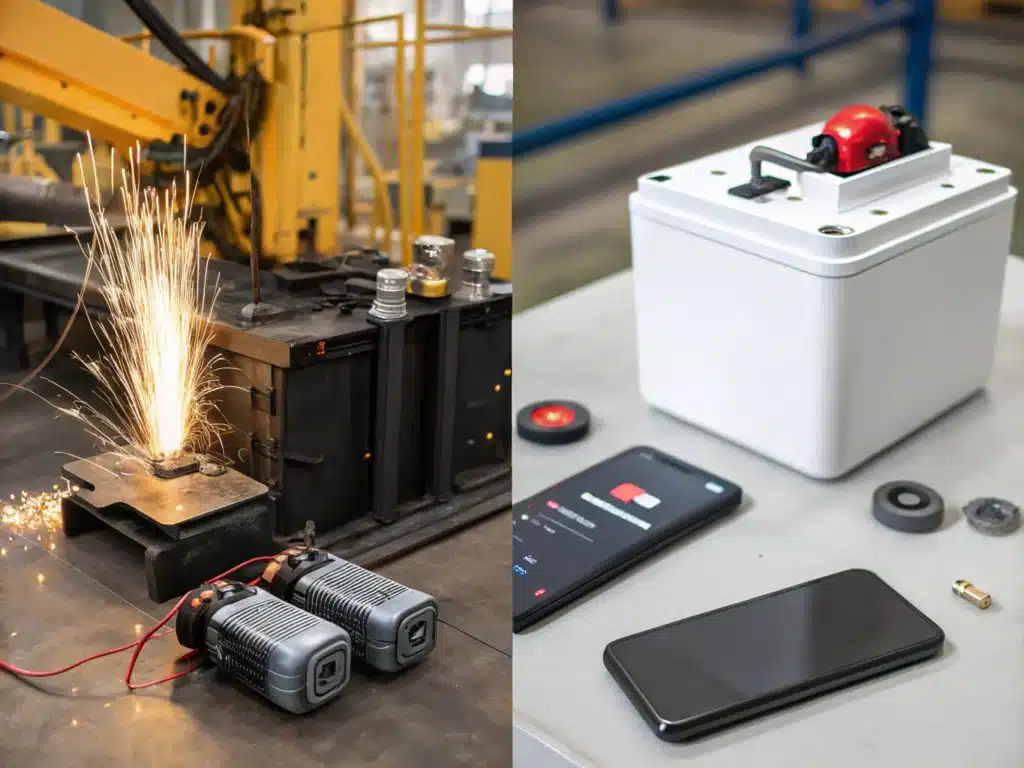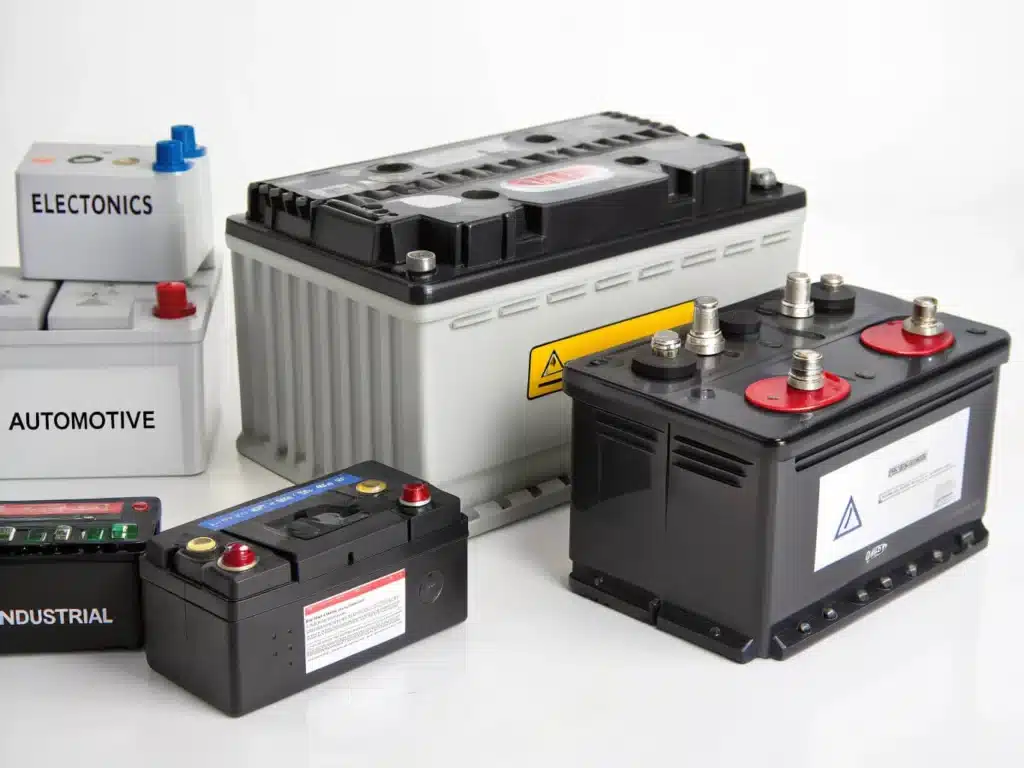We need batteries in our daily life and industry. Mobile phones, Bluetooth headsets, electric cars, energy storage, etc. are all inseparable from batteries. Industrial batteries and ordinary batteries seem to be similar, but they are actually very different. Industrial batteries are mainly used in industrial equipment, such as forklifts, communication base station backup power supplies, etc. Ordinary batteries are what we use in remote controls and flashlights in our daily lives. There are obvious differences in the application areas and performance of the two. Next, I will tell you in detail about the differences in other aspects.
Table of Contents
ToggleWhat is industrial battery?
Industrial batteries are designed for special industrial needs. Lead-acid batteries are often used in heavy equipment such as forklifts because they can output large currents to meet the needs of frequent start-stop and heavy-load operations of forklifts. Lithium iron phosphate batteries are often used in energy storage systems. With their high energy density, they can efficiently store and release electrical energy.
In addition, batteries for factories, transportation and communication base stations are all industrial batteries.
What is regular battery
Ordinary batteries are designed for mass consumer products. Alkaline batteries are commonly found in remote controls, which have the characteristics of low power consumption and low frequency of use. Zinc-manganese batteries are mostly used in flashlights, which are low-cost and meet the needs of continuous lighting. Lithium polymer batteries are the power source for consumer electronic products such as mobile phones and tablets. Ordinary batteries are widely used in various small daily devices and are an indispensable part of life.
Key differences: comprehensive comparison
Industrial batteries are not used in our daily life. They are used for forklifts in factories, life-saving equipment in hospitals, UPS backup power supplies in data centers, and even military equipment. We will conduct a very detailed and comprehensive comparison of key differences.

Performance characteristics
Energy density vs. power density: The former emphasizes high energy density, while the latter emphasizes instantaneous discharge capability. Industrial applications often have higher requirements for the latter.
Discharge capacity (C-rate): Industrial batteries are sometimes required to instantly output a rated current of 5C or 10C, which is critical for many devices.
Cycle life: Industrial batteries are usually required to be able to be charged and discharged repeatedly thousands or even tens of thousands of times, which is a world of difference from the life of ordinary batteries of hundreds of times, and is directly related to the cost of use.
Self-discharge: Many industrial batteries are used as backup batteries and need to be stored for a long time. Therefore, the industry requires low self-discharge.
Durability and construction
Operating temperature range: Industrial batteries are generally required to be able to operate reliably in high temperatures in factories or severe cold outdoors.
Vibration/shock resistance: When installed in mobile equipment (like forklifts) or machines that vibrate frequently, the battery structure must be very sturdy.
Shell material and sealing: It needs to be dustproof, waterproof, and even resistant to chemical corrosion, which is much higher than the requirements for ordinary battery shells.
Safety and standards
Battery Management System (BMS): The BMS of industrial batteries is usually more complex and intelligent, with multiple protections to ensure safety in various extreme situations.
Safety certification: Industrial batteries need to pass more stringent safety certifications, such as UL, CE for specific industries, UN38.3, etc., which are mandatory requirements.
Heat dissipation design: Large currents generate a lot of heat, and industrial batteries generally use a mixed heat dissipation method such as sheet metal casing, bracket and fan.
Lifespan
In addition to cycle life, calendar life is also discussed, which is how long the battery can last before aging even if it is not used much. Generally, lithium iron phosphate batteries and lead-acid batteries have a cycle life of more than 2,000 cycles, while conventional batteries only have a cycle life of about 500.
Cost
Industrial batteries are generally more expensive in initial purchase cost.
But more importantly, you need to analyze the total cost of ownership (TCO). Taking into account replacement frequency, maintenance requirements, downtime losses, etc., industrial batteries may be more economical in the long run. This is crucial for business decision-making.
Chemical systems and technologies
Both are called lithium batteries. Many industrial batteries use lithium iron phosphate, which focuses more on stability, safety, and longevity rather than simply stacking high energy density.
Typical applications
In order to let you feel the difference between the two batteries more intuitively, you can also quickly distinguish them based on their main application scenarios.

Ordinary batteries are commonly used in small household appliances, such as TV remote controls, wall clocks, and smoke alarms. There are also some portable devices we carry with us, such as ordinary small flashlights, children’s electric toys, and personal audio devices for listening to music. These products either have low power consumption, low requirements for battery performance, or require low prices.
Industrial batteries are often used in factories and warehouses, such as electric forklifts and automated guided vehicles (AGVs). These devices are large, heavy, and frequently used, and require high battery power, life, and durability. There are also 24-hour uninterruptible power supply systems, such as UPS (uninterruptible power supply) in data centers, banks, and hospital operating rooms, as well as backup power supplies for telecommunications base stations.
Industrial batteries are also used for professional power tools (electric drills, electric picks, etc.), which require instantaneous bursts of powerful power and can withstand high-intensity and high-frequency use on construction sites.
Medical-related equipment: Life support systems such as ventilators and monitors in hospitals, as well as various precision diagnostic equipment, have the highest requirements for battery stability and safety. They are all industrial batteries.
New energy field: Some solar/wind energy storage systems also require industrial batteries that can store large amounts of electricity and have a long lifespan.
Sensors and exploration equipment working in harsh environments such as the wild, at sea, and in mines must be able to withstand extreme temperatures, humidity, and vibration. Ordinary batteries cannot meet these requirements, so industrial batteries are the first choice.
Find the right battery for your application
When choosing a battery that suits you, a scientific and systematic evaluation method is essential. The following will help you clarify the direction of battery selection from multiple aspects.

Power and energy requirements: Specify the power at which the device operates, as well as the peak current and continuous operating time. These data determine the capacity and discharge characteristics of the battery. For example, high-power devices require batteries that can provide high current discharge.
Working environment: Consider factors such as the temperature, humidity, vibration, and impact that the device is in. For example, in a high temperature environment, the performance and life of some batteries will be affected, so you need to choose a high temperature resistant battery.
Reliability and life requirements: For medical equipment applications, batteries with high reliability and long life need to be selected; for some non-critical daily equipment, the requirements for batteries are relatively low.
Safety requirements and regulatory restrictions: Make sure the selected battery complies with relevant safety standards and regulatory requirements. In environments with explosion-proof requirements, explosion-proof batteries must be used.
Budget: Consider both the initial cost of purchasing the battery and the long-term cost of use, including replacement frequency, maintenance costs, etc.
If your equipment requires high reliability, large discharge power and large-scale application, it is recommended to choose industrial-grade batteries.
If your device is portable, low-cost, and needs short-term use, it is recommended to choose ordinary batteries.
Conclusion
Industrial batteries are mainly used in industrial places – professional places with harsh environments that require high reliability, high performance and long life; while ordinary batteries aim to meet the convenience and cost-effectiveness of our daily lives. If you still don’t know how to choose, contact us to help you choose the most suitable battery.
FAQs
Users wonder about cross-compatibility. Explain the potential dangers.
Generally, no. Industrial batteries often have higher voltages or different form factors that are incompatible with consumer devices. Using the wrong battery can damage the device or create a safety hazard. Always check device specifications.
Users might try to save money with cheaper batteries. Explain why this is usually not advisable.
Usually not. Regular batteries are not designed for the demanding conditions of industrial applications. They may have insufficient performance, shorter lifespans, and lack the necessary safety features. This could lead to premature failure, unreliable operation, and potential safety hazards.
Users are increasingly concerned about environmental impact. Discuss lifespan, materials, and recyclability.
It's complex. Industrial batteries can be more environmentally friendly in the long run due to their longer lifespan (less frequent replacement). However, the materials used and the manufacturing processes can have significant environmental impacts. Proper recycling is crucial for both industrial and regular batteries.
Users might consider mixing battery types. Strongly advise against this.
No, you should never mix industrial and regular batteries, nor different types or brands of batteries. Mixing batteries with different voltages, capacities, or chemistries can lead to unpredictable performance, damage to the batteries or device, and potential safety hazards.
Problem: Users need to understand maintenance requirements. Solution: Describe the differences in maintenance practices.
Regular batteries are typically maintenance-free (replace when depleted). Industrial batteries may require periodic inspections, voltage checks, and (for some types like lead-acid) electrolyte monitoring. Always follow the manufacturer's maintenance recommendations for industrial batteries.
